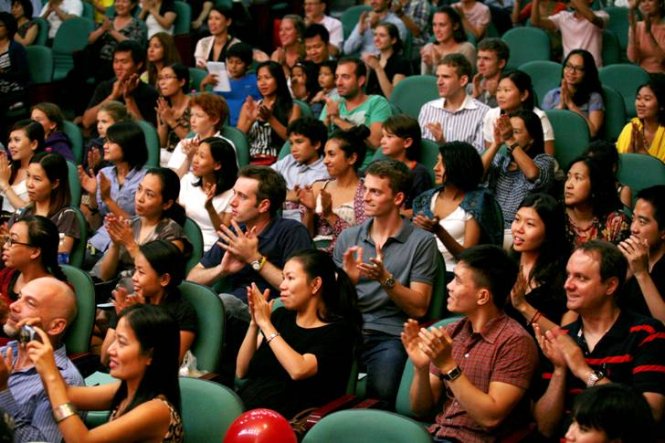Though of good quality, most plays of drama, “cai luong” (modern folk opera popular in southern Vietnam), “tuong” (traditional Vietnamese opera) and “cheo” (northern stage performance) produced by theaters in Hanoi and Ho Chi Minh City have been commercial flops, as audiences are reluctant to buy tickets.
Over the past few years most theaters in Hanoi, including Hong Ha, Dai Nam, Kim Ma, No. 1 Trang Tien, and Chuong Vang have faced tremendous difficulty staging their shows.
Though each play takes up to three months to produce and rehearse, most of them are staged only two or three times, or sometimes even just once.
“Best-selling” plays such as “Khi Hoa No Trai Mua” (When Flowers Bloom Unseasonally), “Yeu La Thoat Toi” (Love Means Sin Erasure), “Mong Gio Dung Doi Chieu” (Hope The Winds Don’t Change Directions), and “Dung Giua Troi Xanh” (Standing in the Blue Sky), which are produced by the Hanoi Cai Luong Theater, can only be staged three times on average each month.
Though dramas fare slightly better than “cai luong” and “cheo” productions, even high-profile plays including “Nha Osin” (Domestic Workers’ House) and “Hon Truong Ba Da Hang Thit” (Swapping Bodies), which were produced in 2012 and 2013 by the Tuoi Tre (Youth) Theater, are rarely performed on a monthly basis.
Every theater in Hanoi and other northern provinces produce their plays on state funds.
Those which operate under the Ministry of Culture, Sports, and Tourism, including the Tuoi Tre Theater, Vietnam Cheo Theater, and Vietnam National Drama Theater, are allocated roughly VND1.5 billion (US$70,602) each year to produce two new plays and re-enact two old programs.
Meanwhile, an average of roughly VND500 million ($23,534) is earmarked for each of the plays produced by the theaters under the Hanoi Department of Culture, Sports, and Tourism.
Truong Nhuan, director of the Tuoi Tre Theater, complained that the amount is barely enough for play production, and the allocations equally divided among the theaters, notwithstanding their different performances, fail to provide incentives to ones that perform well.
However, few people are willing to buy tickets for the drama, “cheo” or “cai luong” plays.
“As I’m also in charge of ticket distribution, I understand quite well why interest in theater has waned. First, they have many other interests to indulge in in today’s world. But more importantly, the habit of going to theaters through invitation tickets since the period of state budget subsidies during the 1980s has long been hardwired into people’s mindsets, further deterring them from buying tickets to any shows,” noted veteran artist Thuy Mui, director of the Hanoi Cheo Theater.
“We’re overjoyed to see audiences packing our theater, though on invitation tickets,” shared meritorious artist Hoang Dung, director of the Hanoi Drama Theater.
Dung wistfully recalled his childhood, when the local theater was at its peak during the 1970s and 1980s. He would stand outside theaters, desperately wanting to get in, watching throngs of people queue for tickets to the shows.
Over the past 10 years, local theaters have made tremendous publicity efforts, including launching websites and Facebook pages to promote their new plays with trailers and sending publicity staff to almost every corner of Hanoi to introduce their new plays.
Pham Ngoc Tuan, director of the Vietnam Tuong Theater, lamented that like other theaters, his staff’s efforts have yet to pay off.
Drama theaters in Ho Chi Minh City, which have long been known for their dynamic performance, are also experiencing an audience crisis.
Seasoned artist My Uyen, deputy director of the San Khau Nho 5B Theater, sadly shared that many shows only sell 30-40 tickets, covering less than one-third of their minimal operation costs.
Her employees usually make reimbursements as there are not enough audience members to stage the plays.
“After several years of working as a show manager, I’ve never experienced such a tough time as now,” lamented veteran artist Hong Van, director of the Hong Van Theater.
More revival efforts
Undaunted, several theaters are continuing their efforts to draw more spectators and boost ticket sales.
Since last year, the Tuoi Tre Theater has coordinated with Hanoi Commercial Joint Stock Bank in launching 100 free performances of plays written by revered late Vietnamese playwright Luu Quang Vu.
The last performance of the program, which benefits students at 109 universities throughout Hanoi, takes place tonight.
According to Truong Nhuan, director of the Tuoi Tre Theater, since 2009, his theater has regularly held cultural exchange projects with embassies and foreign culture exchange centers to bring the world’s classic plays to local and expat audiences, such as “The Caucasian Chalk Circle” – one of the most-performed German plays; and ‘Macbeth,” written by world-renowned playwright William Shakespeare.
The theater produces 10-12 new plays and re-enacts 4-8 old plays each year.
Tickets to most of the plays cost VND120,000-150,000 (up to $7) apiece.
Nhuan added that his theater has also boosted its publicity efforts, and is offering free drama, singing, and dancing classes from October 2014 to January 2015.
Though well past their heyday, Idecaf and The Gioi Tre Theater, the current best-performing drama theaters in Ho Chi Minh City, still enjoy good attendance. Most of Idecaf’s plays are packed with people who book tickets one week in advance for plays which debuted years ago.
However, Huynh Anh Tuan, Idecaf’s director, said that recently, his theater has launched a number of children’s plays to 'sustain' their adult plays.
Meanwhile, the appeal of plays staged at the The Gioi Tre Theater comes from its young, fresh artists, and their continuous updates and incorporation of local youth’s high-profile events and lifestyles in their plays.
Other theaters are also continuing their efforts, including raising capital from young artists, like the cooperation between the Buffalo group and the 5B Theater, which hosts local versions of beloved foreign plays.
Other efforts include holding online games and featuring VIP programs.
Like us on Facebook or follow us on Twitter to get the latest news about Vietnam!



















































